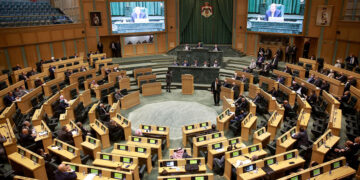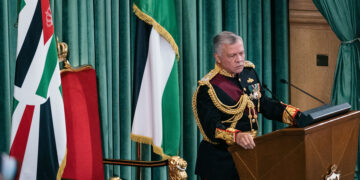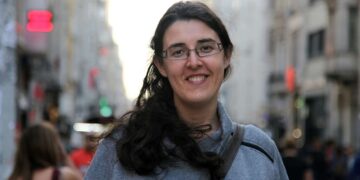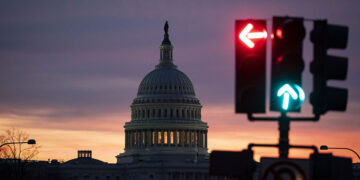Al-Ahmari Helped Cover Up Jamal Khashoggi's Murder, Sentenced Brother of Exiled Saudi Cleric to Death
(Washington D.C., January 23, 2024) – The State Department should sanction Awadh al-Ahmari, the Head of the Saudi Specialized Criminal Court (SCC), pursuant to the Khashoggi Ban and bar him from travel to the United States for his role in extraterritorial, counter-dissident activities, said Democracy for the Arab World Now (DAWN) today, in a submission to the State Department.
The organization presented details of how al-Ahmari helped conceal evidence from the Turkish authorities in the murder of Saudi journalist Jamal Khashoggi in Istanbul in 2018, leading to the exoneration of Saudi Crown Prince Mohammed bin Salman (MBS) and other high-level Saudi officials. It also provided evidence of al-Ahmari's role as the Head of the SCC in targeting family members of peaceful dissidents abroad, such as Mohammed al-Ghamdi, brother of Saudi dissident cleric Dr. Saied al-Ghamdi in self-exile in the UK.
"The State Department created the Khashoggi Ban for officials like al-Ahmari and they should ensure that he is at least not welcome in the U.S.," said Sevag Kechichian, Senior Researcher at DAWN. "Al-Ahmari made sure that those responsible for Khashoggi's killing got away with murder and he continues to target and punish peaceful activists outside of Saudi Arabia."
DAWN's submission explains al-Ahmari's role in the purported Saudi investigations of Khashoggi's murder, as he accompanied the Saudi Attorney General to Istanbul and helped lead the investigations that helped obfuscate and avoid implicating MBS, who the U.S. intelligence reports concluded had ordered the murder, and whose role in the murder the UN Special Rapporteur documented. The investigation led by al-Ahmari also exonerated other high-level Saudi officials, such as Saud al-Qahtani, though the US government and other governments sanctioned him for his role in Khashoggi's murder.
At the Istanbul consulate, al-Ahmari participated in a Saudi government cover-up of the crime, during which the Saudi team thoroughly and forensically cleaned the crimes scenes before allowing Turkish investigators to have limited access and prevented them from draining a well located in the Consular's residence where investigators believe the perpetrators hid Khashoggi's remains. Al-Ahmari and the team also refused to share evidence with the Turkish authorities, including testimonies of members of the Saudi hit team, prevented Turkish authorities from interrogating the suspects implicated in the crime, and provided false information to the public about what had transpired, including that Khashoggi had left the Consulate, that the killing was an accident, and that it was carried out by rogue elements.
Al-Ahmari has continued to be involved in the extraterritorial repression of peaceful Saudi activists. A royal decree by MBS appointed al-Ahmari, his close adviser, as Head of the SCC on June 9, 2022, despite al-Ahmari's lack of qualifications and judicial training. On May 28, 2023, al-Ahmari, who heads the terrorism court and supervises its judges, assigned the case of Mohammed al-Ghamdi, the brother of Saudi dissident cleric in self-exile in the UK, Dr. Saied al-Ghamdi, to three unnamed SCC judges. On July 10, 2023, they sentenced al-Ghamdi to death for his peaceful social media posts. According to Dr. al-Ghamdi, the sentence against his brother was a retaliatory punishment against him due to his peaceful dissident activism in exile in the UK. As head of the SCC, al-Ahmari reviewed and approved al-Ghamdi's death sentence, as he is required to do in all cases where defendants are accused of crimes punishable by death or are sentenced to death by the court.
Al-Ahmari also previously served as a detective in the State Security Circuit within the Public Prosecution Office from 2010 to 2022, where he was complicit in the torture, extraction of forced confessions, and detention of peaceful activists in Saudi Arabia, according to anonymous sources interviewed by DAWN in September and October 2022. Typically judges must complete at least two years of judicial training and studies at the High Judicial Institute, in addition to obtaining a bachelor's degree in law or its equivalent. Al-Ahmari did not acquire these and did not go through the channels of judgeship typically followed in the country like the two years training and clerking for a judge, according to a judge whom DAWN spoke to on October 14, 2022.
"MBS rewarded al-Ahmari by appointing him to head one of the most notorious courts in Saudi Arabia because he knew al-Ahmari would continue usurping laws and abusing the Saudi justice system to punish family members of dissidents abroad," said Kechichian. "Without blindly loyal enablers like al-Ahmari, MBS could not maintain his severe repression of Saudi society and exiled activists."
One source close to a prominent Saudi human rights defender, whom DAWN is not naming to protect them from government retaliation, told DAWN on September 7, 2022 that al-Ahmari interrogated their family members in 2013 about their peaceful activism and extracted forced confessions from them. As a result, the activist was sentenced to very long imprisonment and suffered permanent damage to his body. Another source, a prisoner of conscience whom DAWN is also not naming for safety reasons, told DAWN on October 12, 2022 that al-Ahmari interrogated him in 2014 about videos he posted to YouTube and forced him to sign a confession that he was an "extremist" and "terrorist." When the prisoner retracted his confession in court, he said that al-Ahmari locked him in solitary confinement for months, a form of torture, until he confessed again under threats from al-Ahmari. He said that al-Ahmari dictated his confession verbatim and then coerced him to sign it. As a result, he was sentenced to and served years in prison.
MBS's appointment of al-Ahmari by royal decree followed the arrest of 10 judges, six from the SCC, on April 11, 2022. The arrests and prosecution of these judges bear striking resemblance to previous purges of perceived rivals of MBS, and their charges appear to be politically motivated, with no credible evidence presented against the accused, according to a source with knowledge of the trial and who said he reviewed the court documents presented against the defendants. The same source added that officials from the State Security Circuit of the Public Prosecution Office charged the SCC judges after they signed confessions stating they had been too "lenient" in the State Security cases they presided over during their tenures as SCC judges. Following the purge and new appointments, the SCC issued several extreme prison sentences, overturning much shorter sentences issued by lower courts, including sentencing two Saudi women to 34 and 45 years in prison, respectively, for their use of social media. The same source informed DAWN that the judge presiding over the trial of these 10 judges is Awad al-Ahmari.
"By imposing a Khashoggi Ban on al-Ahmari, the State Department could help ensure a minimal accountability of perpetrators of transnational repression," said Raed Jarrar, DAWN's Advocacy Director. "Perpetrators who are officials in 'partner' countries commit egregious abuses, and the State Department should go after them with the same resolve as it does with its political enemies, such as Russian officials."
Saudi Arabia has continued to target and attack activists outside of the country in an effort to stifle and punish critics of its human rights abuses. While MBS has increased the pace of repression in Saudi Arabia, he and his close advisors also have recruited Saudis and others in the United States to spy on Saudi dissidents, and to harass and intimidate them. In January 2023, DAWN uncovered how the Saudi government infiltrated Wikipedia, with Saudi-based administrators that posted problematic content and were subsequently banned by Wikimedia, and also imprisoned Saudi administrators who apparently refused to act as Saudi spies. In October 2022, Ibrahim Alhussayen, an agent of the Saudi government, pled guilty to lying to FBI agents about social media accounts he used to intimidate Saudis in the US and Canada and was sentenced to two months in prison followed by deportation.
Prior to this, US authorities prosecuted two former Twitter employees for spying on Twitter users on behalf of the Saudi government. In December 2022, a court sentenced one former Twitter employee, a dual Lebanese-US citizen, Ahmad Abouammo, to 42 months in prison after being found guilty in August 2022 of spying on Saudi dissidents by accessing their Twitter accounts and sharing their personal information with the Saudi government. The other employee, Ali Alzabarah, a Saudi citizen who accessed the personal information of more than 6,000 Twitter users in 2015, fled to Saudi Arabia and evaded trial. US prosecutors charged a third person, Ahmed Almutairi, for acting as an unregistered agent for the Saudi government in the Twitter spying scheme, and stealing private information. He is listed as a "Most Wanted" fugitive by the FBI.
The Khashoggi Ban is a State Department policy to bar foreign government agents engaged in extraterritorial counter-dissident activities from traveling to the United States. DAWN, in coordination with partners and U.S. government officials launched the Khashoggi Ban Working Group—a civil society coalition that works in coordination with the U.S. State Department to develop the guidelines for implementing the Khashoggi Ban. In September 2022, in coordination with DAWN, Congresswoman McCollum submitted a bill that would codify the Khashoggi Ban and allow U.S. plaintiffs to sue foreign states when they injure or kill a U.S. resident abroad for his dissident activities, such as the Saudi murder of Khashoggi. The Khashoggi Ban will serve to complement the Global Magnitsky Act, which empowers the U.S. President to sanction foreign individuals and entities implicated in serious human rights violations in their home countries.







































